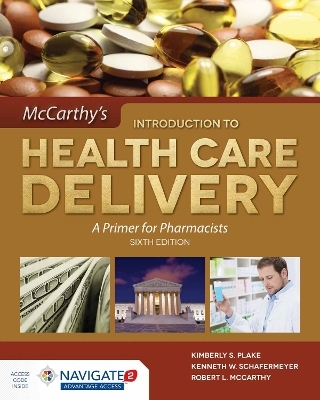
McCarthy's Introduction to Health Care Delivery: A Primer for Pharmacists
Jones and Bartlett Publishers, Inc (Verlag)
978-1-284-09410-7 (ISBN)
- Titel z.Zt. nicht lieferbar
- Versandkostenfrei innerhalb Deutschlands
- Auch auf Rechnung
- Verfügbarkeit in der Filiale vor Ort prüfen
- Artikel merken
Kimberly S. Plake is an Associate Professor of Pharmacy Practice at Purdue University College of Pharmacy.' Dr. Plake obtained her B.S. in Pharmacy from Butler University in and her Ph.D. in Pharmacy Administration from Purdue University.' She has a background in community pharmacy, which is reflected in her teaching and research.' These interests predominantly focus on improving patient care, including medication safety, health behavior theory, medication adherence, health literacy, and cultural issues in health care.' She currently is involved in projects in each of these areas, as well as in the evaluation of the instructional methods she uses to teach these topics to her students.' In addition, Dr. Plake established and directs a fellowship program at Purdue University with a focus on academe and ambulatory care. She has been named a fellow of the Purdue University Teaching Academy and the American Pharmacists Association.' Dr. Plake's teaching awards include honorable mentions for two Innovations in Teaching portfolios from the American Association of Colleges of Pharmacy, as well as the Purdue University College of Pharmacy Dr. Aziz Award for Outstanding Teaching and Purdue University Charles B. Murphy Outstanding Undergraduate Teaching Award. Kenneth W. Schafermeyer is Professor of Pharmacy Administration and Director of Graduate Studies at the St. Louis College of Pharmacy where he has worked since 1990.' Previously, he served nine years as a state pharmacy association executive and lobbyist and served as consultant for several managed care and Medicaid agencies. Dr. Schafermeyer earned his B.S. in Pharmacy from the St. Louis College of Pharmacy, a M.S. in pharmacy administration from the University of Tennessee and a Ph.D. in pharmacy administration from Purdue University.Dr. Schafermeyer has published extensively in the areas of health economics, managed care coverage of pharmaceuticals, financial management, and' maximizing the use of pharmacy personnel. He has authored or coauthored 22 books and manuals as well as chapters in seven other textbooks. He has been named Educator of the Year for the St. Louis College of Pharmacy and also received the Emerson Electric Excellence in Teaching Award.' Robert L. McCarthy is Professor and Dean Emeritus after serving'as Dean of the School of Pharmacy at the University of Connecticut from October 2003 to June 2013.'He joined UConn in August 2001 as Head and Professor in the Department of Pharmacy Practice.' Previously, he was Founding Dean of the School of Pharmacy—Worcester at the Massachusetts College of Pharmacy and Health Sciences.' He has also held faculty positions at Northeastern University, Boston University, and the Forsyth School for Dental Hygienists, all in Boston.' Dr. McCarthy earned his B.S. in Pharmacy, M.S. in Hospital Pharmacy, and Ph.D. in Law, Policy and Society at Northeastern University in Boston.' He also completed an ASHP-accredited residency in hospital pharmacy at the Massachusetts General Hospital.' Dr. McCarthy was a 1999-2000 American Council on Education Fellow.'Dr. McCarthy’s interests lie in the areas of health care policy, especially as it relates to pharmacy and pharmacy ethics.' His scholarship has focused on the ethical issues facing pharmacy practitioners including the right to medication and the impact of managed care, as well as teaching and learning strategies in pharmacy ethics.' He has taught courses in health care systems, health care policy, and biomedical ethics.Dr. McCarthy currently leads the University of Connecticut's interprofessional effort through chairing the Committee on Interprofessional Excellence in Healthcare.
| Erscheinungsdatum | 21.09.2016 |
|---|---|
| Verlagsort | Sudbury |
| Sprache | englisch |
| Gewicht | 1191 g |
| Themenwelt | Medizin / Pharmazie ► Gesundheitswesen |
| Medizin / Pharmazie ► Pflege | |
| Medizin / Pharmazie ► Pharmazie ► PTA / PKA | |
| ISBN-10 | 1-284-09410-3 / 1284094103 |
| ISBN-13 | 978-1-284-09410-7 / 9781284094107 |
| Zustand | Neuware |
| Informationen gemäß Produktsicherheitsverordnung (GPSR) | |
| Haben Sie eine Frage zum Produkt? |
aus dem Bereich


